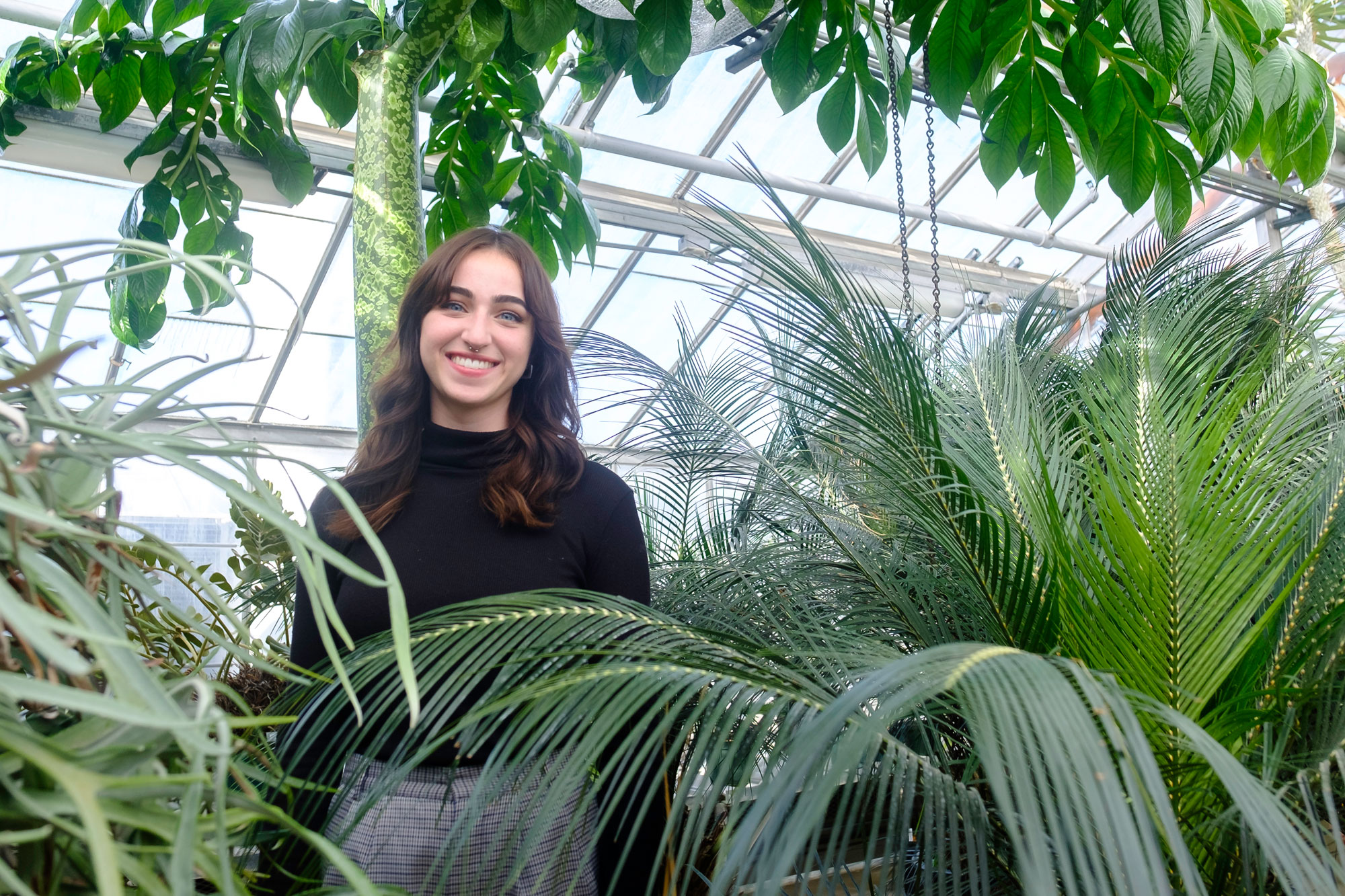
For Karrin Tennant, recipient of the College of Science Undergraduate Research Award, the never-ending story of environmental science has plenty of plot twists. A member of the Anderegg lab in the School of Biological Sciences (SBS) which studies the intersection of ecosystems and climate change, Tennant has been busy working in the area of nighttime water loss in plants. The work tests a major hypothesis in the field and has the potential to greatly advance our understanding of plant physiology. The award is given annually to the College’s most outstanding senior undergraduate researcher. Tennant will be honored at the College Convocation May 6th and receive a $1,000 award, a plaque commemorating this achievement, and a one-year membership in the American Association for the Advancement of Science (AAAS), which includes a one-year subscription to Science.
In his letter of support, Assistant Professor Bill Anderegg and Principal Investigator says, “Karrin has blown me away with her incredible independence, creativity, dedication, initiative, and intellectual maturity. Her Biology Honors research is incredibly exciting, eminently publishable, and on par with advanced and successful Ph.D. students I have mentored.”
One of those plot twists includes nighttime transpiration through tiny pores known as stomata on the underside of tree leaves. Photosynthesis, the process by which green plants and some other organisms use sunlight to synthesize foods from carbon dioxide and water, clearly happens during the day. But why and how do trees like the Black Cottonwood in the Pacific Northwest, continue to draw H20 from the ground at night? “What’s the ecological value of this happening?” Tennant asks. At night “can trees pull water from underground like a straw away from competitors?”
Answers to these questions have implications about how forests survive and thrive, especially during drought as the earth continues to warm globally. Tennant sees her work as multi-faceted … and multi-disciplinary–narrative threads that tell the broader story of not only life systems, as in forests, but even larger systems, and not only ecological.
Tennant’s minor in Ecology & Legacy Humanities, introduced to her by adjunct biology professor and Dean of the Honors College Sylvia Torti, extends the questions Tennant is addressing both in the field and in the lab. The intersection between biology and the humanities fosters empathy for the natural world that can inform public discourse as well as public policy that extends beyond scientific inquiry. This “leaning into the interdisciplinary,” says Tennant, is what propels her learning at the University of Utah and what appears to be the foundation of an auspicious career later in forest ecology and related fields.
 In the meantime Tennant pivots between collecting leaf samples from as many as thirty-five trees in various degrees of competition with each other for water and the lab which includes the School’s greenhouse. Utilizing growth chambers she measures the gas exchange rate and other physiological measurements under the lens of a Licor 6800 microscope. She and her team also conduct statistical tests using research software, initiating how the micro affects the macro of ecological systems.
In the meantime Tennant pivots between collecting leaf samples from as many as thirty-five trees in various degrees of competition with each other for water and the lab which includes the School’s greenhouse. Utilizing growth chambers she measures the gas exchange rate and other physiological measurements under the lens of a Licor 6800 microscope. She and her team also conduct statistical tests using research software, initiating how the micro affects the macro of ecological systems.
A Texas native, Tennant was attracted to the U because of family in the area and, of course, the mountain environment. Along with her passion for science, she says, “they’re what kept me here.” Her ambition is to be a research professor someday, to “spread my knowledge and education as far as I can,” and “to apply focused research to a much broader discussion.”
That discussion has added to the story that Tennant is helping to author, and it seems to move with extraordinary balance and ease between more than one campus lab (she also works with SBS’s Bryn Dentinger’s fungi lab at the Natural History Museum of Utah), the forest field and the broad community contours represented by the humanities.
In her citation for the award, Dean Peter Trapa talked about Tennant’s demonstrated “genuine wonder of the world around” her and her “thirst for knowledge.” Her response to the award? “I am honored to be a woman in STEM and to follow the footsteps of other trailblazing female researchers.”
By David Pace
